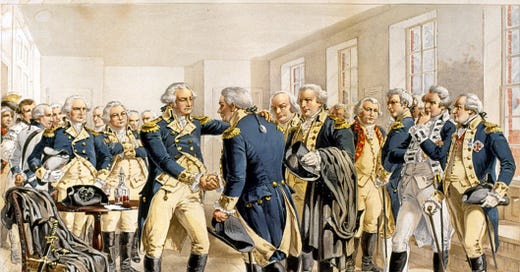On October 19th, 1781, Lord General Charles Cornwallis surrendered his sword by proxy to the Continental Army at Yorktown, Virginia, concluding major operations in the War for Independence which had raged since 1775. After the surrender had largely neutralized the threat from the British, Americans were free to fight each other, and rushed to do so right away.
In point of fact, Yorktown had only ended the British offensive in the south. In the north, the British still maintained a garrison of some 32,000 troops in New York City. In the diplomatic negotiations towards a peace treaty which Yorktown had made possible, this garrison would allow Great Britain to negotiate from a position of strength.
Thus it was that the Continental Congress would not disband the Continental Army, yet all the army could do in the interim was stand by and await the results of the peace talks, which started in Paris in the Spring of 1782. This left an army in the field, with virtually no enemy to fight, and nothing to do but wait around as provisions dwindled. Since the need for a standing army seemed diminished, the Thirteen States under the Articles of Confederation felt little urgency to continue volunteering funds and supplies to the Continental Congress for distribution to the army. The arrears in salaries for the Continental troops were mounting, and in the downtime, all these soldiers could do was nurse grudges as food and clothing grew scarcer.
Encamped in Newburgh along the Hudson River, inflammatory letters began to circulate amongst the Continental Army. One letter suggested that the army disband, which would leave the inchoate country with nothing to counter the British garrison in nearby New York City. Another letter suggested that the army march on the Continental Congress to demand payment, in effect proposing a military coup of the fledgling country. Some dissenters even proposed coronating General George Washington as a king, who would wield the army under his command to impose his will on the country.
This cadre of disgruntled Continental officers, which historians call the Newburgh Conspiracy, convened on March 15th, 1783. Though General Washington had initially signalled that he would not attend the gathering, he did arrive and was immediately ceded the floor. Though he was never known for oratory, Washington harangued the officers about the dangers of weaponizing the army against the country’s civilian authority. He beseeched the officers to confide in the Continental Congress’ honorable intentions. To corroborate his plea for patience, General Washington began to read a letter from Joseph Jones, a Virginian congressman who had written to assure Washington of Congress’ intention to pay the officers, but Washington struggled to read the letter. He fumbled in his pocket and extracted a pair of reading glasses, which he donned saying, “Gentleman, you must pardon me, for I have not only grown gray but almost blind in service to my country.” The assembled conspirators were thus poignantly reminded that General Washington – who had personally paid and provisioned his troops to the extent he could afford – had already sacrificed so much for the cause of Independence, just like countless other citizens. The conspirators felt contrition for their demands and decided to await a resolution from Congress, which came on March 19th, awarding full payment of officer pensions for five years.
Whereas the United States of America could have gone the way of many countries by subverting civilian authority to a generalissimo’s dictates, that arrangement holds no appeal to most Americans, as General Washington correctly recognized. On an individual level, Americans harbor a healthy aversion to power, realizing that people should be free to choose their own way through life. It could even be said that this Libertarian ethic inheres in our collective conscience
.





“A healthy aversion to power” - I am a big fan of this phrase. It’s going into my vocabulary bank immediately!
Thank you for offering a more nuanced look at history. We never hear about the inner turmoil within the country - most of our discussion of the end of the war make it seem like after signing the treaty at Yorktown everyone lived “happily ever after”